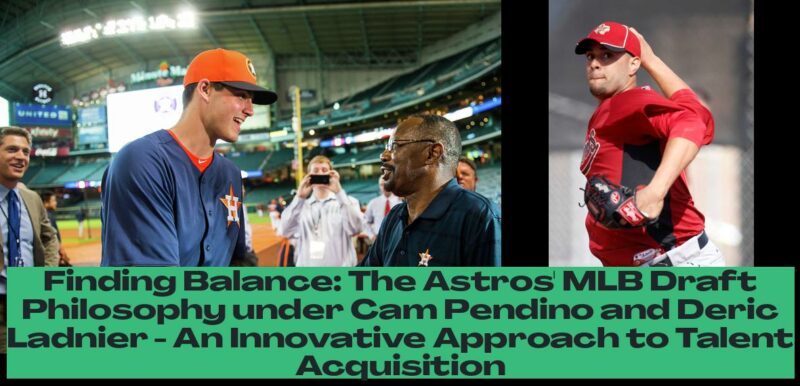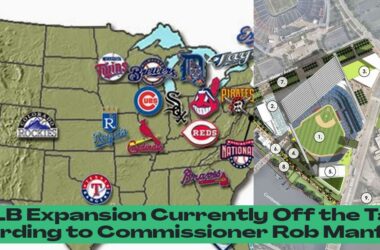A Tale of Two Scouts: How the Astros’ Draft Philosophy Embraces Balance
In the world of Major League Baseball, the quest for talent is relentless. Teams are constantly searching for the next diamond in the rough, the next future star who can propel them to championship glory. The Houston Astros, a franchise known for its analytical approach to the game, are no exception. However, under the leadership of General Manager Dana Brown, the Astros are taking a unique approach to talent evaluation, one that blends the traditional scouting methods of the past with the data-driven insights of the present.
Brown, a seasoned scouting executive himself, has embraced the concept of “balance” in his rebuild of the Astros’ scouting department. This philosophy is exemplified by the pairing of two individuals with contrasting backgrounds and approaches: Deric Ladnier, a veteran scout with a keen eye for talent, and Cam Pendino, a young, data-driven analyst who has risen through the ranks of the Astros’ organization. Together, they represent the perfect blend of experience and innovation, traditional scouting and advanced analytics.
Ladnier brings a wealth of experience to the table, having spent years in the minor leagues as a player and subsequently establishing a successful career as a scout. His methodology is rooted in intuition and observation. He relies on his gut feeling, honed over decades of watching countless games, to identify potential in players. Pendino, on the other hand, represents a new breed of scout, one who relies heavily on data and analytics to evaluate players. He meticulously analyzes statistics, video footage, and player metrics to identify hidden gems and project future performance.
The Astros’ draft philosophy under Brown is not simply about choosing one approach over the other. Instead, it emphasizes the integration of both scouting and analytics to create a comprehensive and holistic evaluation process. Brown understands that relying solely on either method can lead to biases and blind spots. By combining the strengths of both approaches, the Astros aim to create a more well-rounded and objective view of potential draft picks.
Pendino himself acknowledges the importance of this balanced approach, emphasizing that information drives the process. “I reject the analytics versus scouts, black and white debate,” he says. “We have a tried and true process, weigh all the pieces of information, and these are baseball decisions. We’re going to use our baseball intuition to make the best possible decision.” His words highlight the Astros’ commitment to combining data-driven insights with traditional scouting expertise, allowing them to make informed decisions based on a comprehensive understanding of each player.
The Importance of a Balanced Approach
The Astros’ decision to embrace balance in their draft philosophy is not simply a matter of choosing between two competing schools of thought. It is a strategic move aimed at maximizing their chances of success in the increasingly competitive world of MLB scouting. The combination of traditional scouting and advanced analytics creates a synergistic effect, allowing the Astros to identify players with a greater degree of certainty and confidence.
Traditional scouting offers a unique perspective on players that data alone cannot capture. Scouts have the ability to analyze a player’s intangible qualities, such as work ethic, attitude, and leadership skills, which are often difficult to quantify. They can also assess a player’s ability to handle pressure situations and adapt to different environments, factors that are crucial to long-term success. In addition, experienced scouts can draw on their vast database of knowledge and observations to identify players who may not have the flashy statistics but possess the potential to develop into valuable assets.
However, relying solely on scouting can lead to biases and inaccurate assessments. Scouts are human, and their opinions can be influenced by personal preferences, past experiences, and even unconscious biases. This is where analytics come in. Advanced analytics can provide objective and statistically grounded insights into a player’s performance. They can identify trends and patterns in a player’s data, highlighting areas of strength and weakness that may not be immediately apparent to the naked eye. Analytics can also help scouts project a player’s future performance based on past data and identify hidden gems who may have been overlooked by traditional scouting methods.
The Astros’ commitment to balance is evident in the leadership structure of their scouting department. Pendino, the young, data-driven analyst, is now responsible for overseeing the department’s day-to-day operations, while Ladnier, the veteran scout, provides guidance and mentorship. This combination of experience and innovation creates a dynamic and collaborative environment where both traditional scouting and advanced analytics are valued and utilized to make informed decisions.
The Astros’ approach to scouting is a testament to the evolving nature of the sport. In the past, teams relied heavily on traditional scouting methods, but the increasing availability of data and the development of advanced statistical models have transformed the landscape of talent evaluation. Today’s successful teams must embrace a balanced approach, combining the insights of traditional scouting with the power of advanced analytics to gain a competitive edge.
The Astros’ Draft Strategy: A Blend of Experience and Innovation
The Astros’ commitment to a balanced approach is not only reflected in their scouting philosophy but also in their specific draft strategy. The team is acutely aware of the challenges they face in the upcoming draft, particularly their limited bonus pool and the gap between their first and second picks. However, they are not letting these constraints dictate their approach. Instead, they are focusing on identifying talented players who fit their organizational needs, regardless of their draft position or financial considerations.
Ladnier, with his vast experience in different draft scenarios, emphasizes the importance of drafting players who can contribute at the major league level, regardless of their projected role. He stresses that the focus should be on finding talent, whether it be players with high ceilings or role players who can provide depth and versatility. “It may be an up-and-down guy. It might be a guy that’s a role player, whatever,” he says. “But just trying to find talent for the major league club or talent that we can build some depth in this organization.”
Pendino, on the other hand, brings a data-driven perspective to the draft process. He understands the importance of identifying players who fit the Astros’ organizational philosophy and have the potential to contribute to their long-term success. He is particularly interested in players with strong track records and consistent performance, as this data can provide valuable insights into their future potential. Pendino’s analytical approach, combined with Ladnier’s seasoned experience, allows the Astros to create a comprehensive and well-informed draft strategy.
The Astros’ draft strategy is based on the principle of “building depth” within the organization. They are not simply looking for immediate impact players but rather players who can contribute at various levels, providing the organization with flexibility and depth in their farm system. This approach allows the Astros to build a sustainable program, where talented players are constantly emerging, ready to contribute to the team’s success.
The Astros’ draft philosophy is a testament to their commitment to innovation and adaptability. They are not afraid to embrace new approaches and integrate new technologies into their scouting and draft processes. However, they also recognize the value of experience and traditional scouting methods. By combining the best of both worlds, the Astros have created a unique and effective draft philosophy that is helping them build a championship-caliber organization.
The Future of Scouting: A Data-Driven World
The Astros’ draft philosophy is a harbinger of a new era in MLB scouting. As data becomes more readily available and advanced statistical models become more sophisticated, the role of traditional scouting will continue to evolve. Scouts will increasingly rely on data and analytics to inform their assessments, while also leveraging their intuition and experience to identify hidden gems and evaluate player character.
The future of scouting is likely to be a hybrid approach, where traditional scouting methods are integrated with advanced analytics. This means that scouts will need to be comfortable working with data and understanding statistical models, while also maintaining their ability to evaluate players on the field and assess their intangible qualities. The Astros’ current approach provides a blueprint for how teams can leverage the power of data while preserving the importance of traditional scouting.
The Astros’ draft philosophy under Brown is not just about building a winning team; it is about building a sustainable organization that can compete for championships for years to come. By embracing balance and integrating traditional scouting with advanced analytics, the Astros have created a model for success in the modern era of baseball. Their approach is a testament to the evolving nature of the sport and the importance of adapting to new technologies and strategies.
- The Astros’ draft philosophy under Dana Brown emphasizes a balance between traditional scouting methods and data-driven analytics.
- The pairing of Deric Ladnier, a veteran scout with intuition-based evaluation, and Cam Pendino, a young analyst relying on data and metrics, showcases the blend of experience and innovation in talent evaluation.
- By integrating both scouting and analytics, the Astros aim to create a more comprehensive and objective evaluation process for potential draft picks.
- A balanced approach to talent evaluation helps in minimizing biases and blind spots that may arise from relying solely on one method over the other.
- Information is key in driving the draft process, highlighting the importance of combining both traditional scouting expertise and modern analytical insights for successful player selection.









